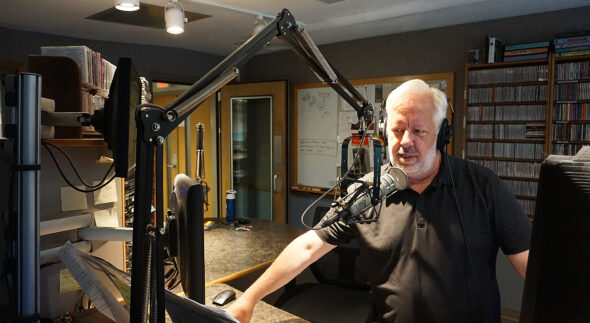
WYSO reporter and host of “All Things Considered” Jerry Kenney warms up before his evening broadcast from the station’s current headquarters at the Kettering Building next to Antioch College. (Photo by Reilly Dixon)
Executive order threatens WYSO funds
- Published: May 20, 2025
On Thursday, May 1, President Trump issued an executive order demanding the Corporation for Public Broadcasting cease all federal funding to NPR and PBS, spurring uncertainty for public media across the country and even here in Yellow Springs.
That executive order, titled “Ending Taxpayer Subsidization of Biased Media,” could mean Yellow Springs-based NPR member station 91.3 WYSO loses $300,000 in expected funds for its upcoming fiscal year.
According to WYSO General Manager and village resident Luke Dennis, the CPB’s Community Service Grant accounts for nearly 10% of WYSO’s annual budget, which in 2025 was $2.9 million.
“Those unrestricted operating funds allow us to pay the salaries of our hardworking staff and to literally pay the electric bill for our 50,000-watt transmitter,” Dennis told the News last week. “It will be an enormous challenge to replace that $300,000, especially with almost no notice. We will have to lean even harder on our generous listeners, who already donate nearly $1.5 million to WYSO each year.”
President Trump’s executive order states that the CPB’s federal funding of NPR and PBS follows an “outdated and unnecessary” media model — one that is “corrosive to the appearance of journalistic independence” and that runs counter to “fair, accurate, unbiased and nonpartisan news coverage.”
In the weeks since the signing of the order, the CPB has launched a lawsuit against the Trump administration.
NPR’s Senior Vice President of Communications Sarah Walls said in a statement released earlier this month that NPR will “vigorously defend [its] right to provide essential news, information and life-saving services to the American public.”
“The President’s order is an affront to the First Amendment rights of NPR and locally owned and operated stations throughout America to produce and air programming that meets the needs of their communities,” Walls’ statement read.
Like Walls, Dennis sees President Trump’s actions as a blunt attack on the fourth estate at large, describing it as a form of censorship.
“I disagree with every piece of language in that executive order,” Dennis echoed. “You know, I wish we had a model where there was a fully subsidized public media in this country. I stand by our journalism — it’s as fair, transparent and middle-of-the-road as anything you’re going to find.”
Dennis said that without the anticipated $300,000 in the 2026 budget, the station may have to roll back some of its national programming, potentially taking NPR shows like “Morning Edition,” “All Things Considered,” “Fresh Air” or “Wait Wait… Don’t Tell Me!” off local airways. Cutting healthcare costs may be another avenue WYSO could make up lost funds, Dennis added.
“But no matter what, I will be damned if we’re going to do any staff reductions,” Dennis said.
“We have worked for so many years to get where we are — we finally have the newsroom we want, a music department that’s really cranking, a great Center for Community Voices,” he said. “There is just no fat anywhere in our [organizational] chart, so we’re looking to save money elsewhere.”
Currently, WYSO is staffed by 21 full-time employees, and according to Dennis, is still set to grow in both its operations and physical footprint. With or without those contested federal subsidies, WYSO is on track to move in October from its longtime home at Antioch College into the Union Schoolhouse.

The Union School House, with new studio and office space for WYSO and professional offices for Iron Table Holdings. (Rendering by Max Crome Architecture)
Owned and under construction by Iron Table Holdings, LLC — local resident and comedian Dave Chappelle’s development company — the renovated Union Schoolhouse, built in 1872, will provide WYSO improved spaces for broadcasting, reporting, performance and hosting community events.
Despite that glimmer of hope on the local front, Dennis said he remains fearful for the future of public media should it continue to be defunded. He specifically cited the CPB’s ability to broker agreements for music licensing that allow smaller-sized member stations to broadcast robust and eclectic playlists.
“The CPB represents the public media system to music rights organizations in negotiating blanket music licenses for noncommercial uses of music, and with a portion of the federal appropriation, the CBP pays those licensing fees for all eligible public media stations,” Dennis said. “If that service goes away, stations like WYSO will not be able to afford to play all the amazing music that we do.”
While WYSO can absorb some cuts to its budget, Dennis worries that may not be the case for smaller NPR member stations — especially those in more rural communities. Should they falter, the whole nationwide network of news-sharing between stations would suffer.
“Our ability to be in conversation with other NPR affiliates throughout the rest of the U.S. is imperiled by federal funding going away,” he said. “What will happen is a great hollowing out of the whole center of the country, where in some places, a federal subsidy could be as much as 50% of their operating budget.”
He continued: “So what that means is that if something significant happens in a small town in, say, Missouri or Oklahoma, NPR would have to parachute reporters in from larger cities who don’t know those communities as well.”
He gave the example of last fall when Springfield, Ohio, fell under the national limelight when stories were falsely peddled about Haitian immigrants eating the pets of area residents, fueling national xenophobia and racism.
“Had it been up to the national media to tell that story, it would have been incomplete,” Dennis said. “We filed national stories [with NPR], and because we were already here and always prioritize sharing the microphone with other people, the country was able to hear the voices of actual Haitian community members. We were able to build relationships locally.”
To support WYSO, PBS, the CPB and other public media outlets in the U.S., Dennis recommended going to http://www.protectmypublicmedia.org, a website that prompts individuals with up-to-date information on federal decisions, as well as contact information for legislators and petitions that advocate for public media support.
The Yellow Springs News encourages respectful discussion of this article.
You must login to post a comment.
Don't have a login? Register for a free YSNews.com account.












No comments yet for this article.